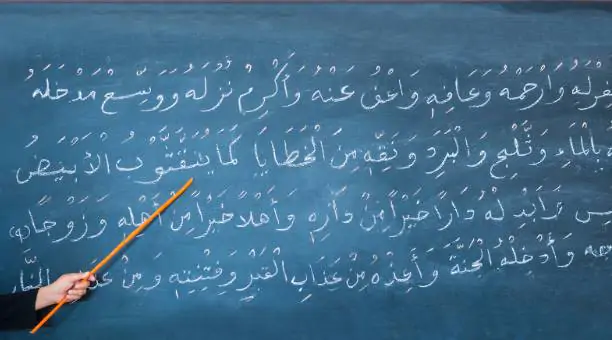9 Most Important Grammar Rules in the Arabic Language

Grammar could be the least favorite part of learning a language. And with the Arabic language reputation of being difficult to learn, the process can be tricky and intimidating .
However, if you get the main rules of Arabic grammar, it can be your key to understanding the nature of this language and gradually grasping it and actually enjoying it. So, here are some grammar rules to remember in the Arabic language.
1. The definite article of the Arabic language is (ال) pronounced (al). It’s the equivalent of “The” in the English language. Unlike other languages, the Arabic definite article is the same for singular nouns, plural,dual, masculine or feminine. Examples:
| The man | الرَّجُل  |
| The woman | المَرْأة  |
| The engineers | المُهَنْدِسون  |
| The two girls | البِنْتان  |
| The two boys | الوَلَدان  |
| The book | الكِتاب  |
2. The words’ endings can help you to identify its gender.
Most of the feminine words have three specific endings which can help you to identify them easily.
| Table | طاوِلة  | ة | 1 |
| Laila “name” | لَيْلَى  | ى | 2 |
| Sky | سَماء  | اء | 3 |
- Keep in mind that there are feminine words that don’t end with these letters and there are masculine words that end with them but they’re fewer.
3. Dual in arabic is so easy
Beside singular and plural, the Arabic language has a dual form. You create it by adding “ان” or “يْن” to the masculine singular word and “تان” or “تَيْن” to the feminine singular word. Actually, the “ت” is added in the place of the “ة”. Examples:
| One man \ Two men | رَجُلان \ رَجُلَيْن  |
| One woman \ Two women | امْرأتان \ امْرأتَيْن
 |
4. Subject pronouns are optional
Since the verb is already conjugated with a definite pronoun so, it’s clear and understandable which person we’re referring to. Examples:
| (we) went to the park. |
ذهبنا إلى الحديقة. (نحن)
 |
| Do you (feminine) study arabic? |
هل تدرسينَ اللغة العربية؟ (أنتِ) |
| (they) will travel tomorrow. |
سيسافرون غدًا. (هُم)
 |
5. Great News! There are no silent letters in Arabic, which means that you pronounce the letters as they are in the word, for example the word 
Note: despite not having any silent letters in Arabic, the “ل ” in the definite article “ ال ” is sometimes not pronounced, in this case we call it “lam shamsiyyah” and when it’s normally pronounced we call it “ lam qamariyyah”. Depending on which letter comes after the definite article you can know whether or not you should pronounce the “ل”.
Letters after  “لام قمرية”
“لام قمرية” | Letters after  “لام شمسية”
“لام شمسية” |
 أ، ب، ج، ح، خ، ع، غ، ف، ق، ك، م، هـ، و، ي أ، ب، ج، ح، خ، ع، غ، ف، ق، ك، م، هـ، و، ي |  ت، ث، د، ذ، ر، ز، س، ش، ص، ض، ط، ظ، ل، ن
ت، ث، د، ذ، ر، ز، س، ش، ص، ض، ط، ظ، ل، ن |
Examples:
- The “ل” in the word “المَدْرسة” is pronounced
, while the one in the word “الدَّرْس” is not
.
| The boy The sky The sun |
الطِّفْل السَّماء الشَّمْس
 | اللام الشمسية |
| The door The newspaper The book |
الباب الجريدة الكتاب
 | اللام القمرية |
- Also, there is an “ا” called “ألِف الوصل” that’s pronounced when you begin the the word with it and skipped when it’s in the middle of the sentence.
Example:
| My exam is tomorrow. | اِمْتِحاني غدًا. |
| My exam was easy. | كانَ امْتِحاني سهلًا. |
6. The future tense doesn’t have different conjugations.
Instead, we use the same conjugations of the present adding just one letter “س” or one word “سَوْفَ” to the beginning of the verb. Examples:
| I will travel next month. |
سَأسافر الشَّهْر القادِم.
 |
| We will meet after the exams. |
سَوْفَ نتقابل بعد الامتحانات.
 |
7. The verb at the beginning of the sentence is always singular regardless of the number or gender of the subject in the case of a verbal sentence.
| The boy helped his father. | Singular subject |
ساعَدَ الولدُ أباه.
 |
| The two boys helped their father. | Masculine dual | ساعَدَ الولدان أباهما.  |
| The two girls helped their father. | Feminine dual | ساعَدَت البنتان أباهُما.  |
| The boys helped their father. | Masculine plural | ساعدَ الأولادُ أباهُم.  |
| The girls helped their father. | Feminine plural | ساعدت البنات أباهُنَّ.  |
8. Verb to be does not appear at all in the present time frame in the Arabic language.
English sentences that are expressed using “verb to be” are often translated into nominal sentences in Arabic, e.g. “I am a student” is translated into (أنا طالب); and “she is young” is translated into (هي صغيرة). When talking about the past or the future, verb to be must appears in the sentence, e.g. “I was a student” is translated into (كنت طالبًا); and “she was young” is translated into (كانت صغيرة).
9. Arabic words are connected
In Arabic there’s a system called “roots”, the Arabic root refers to a three or four consonant base-word which represents a core meaning or concept. Most roots in Arabic are made up of three consonants. A large number of words can be derived from each root, which makes it much easier for learners to memorize and conclude words.
Examples:
| ك - ت - ب | |
|---|---|
| He wrote | كَتَبَ  |
| He writes | يَكْتُبُ  |
| Write! | اُكْتُب  |
| Writer | كَاتِب  |
| Written | مَكْتوب  |
| Writing | كِتابة  |
| Office\ desk | مَكْتَب  |
| Library | مَكْتَبة  |
Finally, mastering Arabic grammar is absolutely doable and it really pays off. Don’t forget to check more grammar lessons here and take a look at Ahlan’s online classes.

Free Lessons
Small lessons for students at different levels which will help you to study Arabic anywhere in the world with total comfort.

Learn Arabic for Free
A great collection of exclusive free resources for you to study Arabic online on your own, or complement your classes with our teachers.
FREE ONLINE ARABIC TEST
Find out your level of Arabic with the personal advice of a native teacher with this level test developed by Ahlan World. Register in 1 minute to take the test, and find out which course is most appropriate for you.











